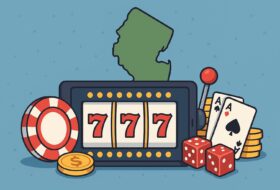
The legal battle over the scope of the federal Wire Act is still moving ahead in New Hampshire.
On Feb. 26, the NH Lottery Commission and Neopollard Interactive submitted their respective responses to a brief the Department of Justice filed with the First Circuit Court of Appeals.
You may recall that the DOJ appealed a ruling from the District Court, which held that a revised memorandum authored by Assistant Attorney General Steven Engel represented an invalid interpretation of the law.
In his decision last June, Judge Paul Barbadoro rejected the department’s efforts to diverge from its own guidance and broaden the scope of the Act.
Refresher on the Wire Act case
The Wire Act is now the principal federal statute that prohibits the operation of interstate sports gambling business. As long it exists in its current form, we will not see interstate compacts for sports gambling like the ones that facilitate multi-state poker.
In 2011, the DOJ’s Office of Legal Counsel followed precedent from the Fifth Circuit Court of Appeals and issued a memorandum articulating that the scope of the statute is restricted to sports betting.
That memo expressly clarified that the Wire Act does not encompass other online gambling activities — including lottery sales, which were the impetus for a request for clarification by officials from New York and Illinois.
Going around the back
For several years thereafter, some members of Congress tried to pass a law called the Restoration of America’s Wire Act. Better known as RAWA, it would have expanded the Act’s scope to include all forms of online gambling.
When that failed to pass, the OLC instead authored a new opinion with the same effect.
The 2018 Engel memo reinterpreted the one from 2011, effectively concluding it was wrong. The New Hampshire Lottery and Neopollard promptly filed a lawsuit seeking a judiciary declaration that the new 2018 interpretation was invalid.
The Lottery won at the District Court level, but the Justice Department appealed to the First Circuit. It filed its initial brief in December, bringing us to the response brief from the plaintiffs.
Lottery has legs to stand on
The New Hampshire Lottery’s first argument is focused on constitutional standing.
In order to bring a lawsuit, something needs to have actually happened — some kind of enforcement. While the 2018 Wire Act memorandum does exist, the federal government has not yet begun enforcing its new interpretation.
The defendants therefore argue that the matter is not “ripe” for litigation, contending that the case should be dismissed because it has not taken any direct enforcement action.
The Lottery argues (and the District Court agreed) that the threat of enforcement is sufficient to satisfy the ripeness doctrine. By the same token, the judge found that a temporary moratorium on enforcement did not make the case moot.
‘The Wire Act only applies to sports betting!’
This is the second argument the plaintiffs advance in their brief.
The Lottery argues that the DOJ’s new interpretation of the Wire Act is “tortured, unnatural, and unpersuasive.” It further contends that the memo is inconsistent with Supreme Court precedent and leads to an incoherent reading of the statute itself.
The key counterargument from the federal government relies on a tedious grammatical analysis of a law written in 1961. The defendants rely on the notion that the phrase “sporting events or contests” modifies only one clause, as opposed to the entirety of the statute as most scholars and courts interpret.
The Lottery, like the majority of observers, argues that the phrase modifies both clauses. That would render the entire statute applicable only to interstate wagering on sporting events or contests.
The Lottery additionally argues that activities other than sporting events are covered by another statute — the Wagering Paraphernalia Act passed the same day — indicating Congressional intent to differentiate the two activities.
Is the DOJ memo a final agency action?
The final substantive argument from the New Hampshire Lottery is that the District Court was justified in setting aside the 2018 Engel memo because it was a “final agency action.”
Generally, courts cannot decide a matter that is still a preliminary concept. In this case, the defendants argue that the OLC memorandum is not a final agency action and the court therefore cannot rule.
The Lottery argues that the federal government waived its ability to raise this assertion. The District Court found the memorandum to be a definitive statement on the Wire Act, and a litigant generally needs to raise arguments with the lower court in order to use them on appeal.
Neopollard, represented by Ted Olson (of Murphy v. NCAA fame), raised slightly distinguishable arguments but hit the same broad points of evidence.
An interesting side note: The brief disclosed that William Hill indirectly owns 10% or more of NeoGames stock.
What’s next in the Wire Act lawsuit?
The plaintiffs’ briefs read largely as expected.
The New Hampshire Lottery and Neopollard’s responses are a strong rebuttal to the arguments asserted in the Department of Justice’s opening brief, but this remains an early point in the appeal. Next will come another reply brief from the DOJ.
Parties typically have 21 days to file a reply, but it is not uncommon for courts to adjust timelines.
As Judge Barbadoro prophesied last year, this case seems to have Supreme Court written all over it. The issues at hand, particularly the finality of OLC memorandums, have true significance far beyond this case.
For that reason — on top of the other gambling related issues — this case likely won’t be finished regardless of the First Circuit’s decision.





